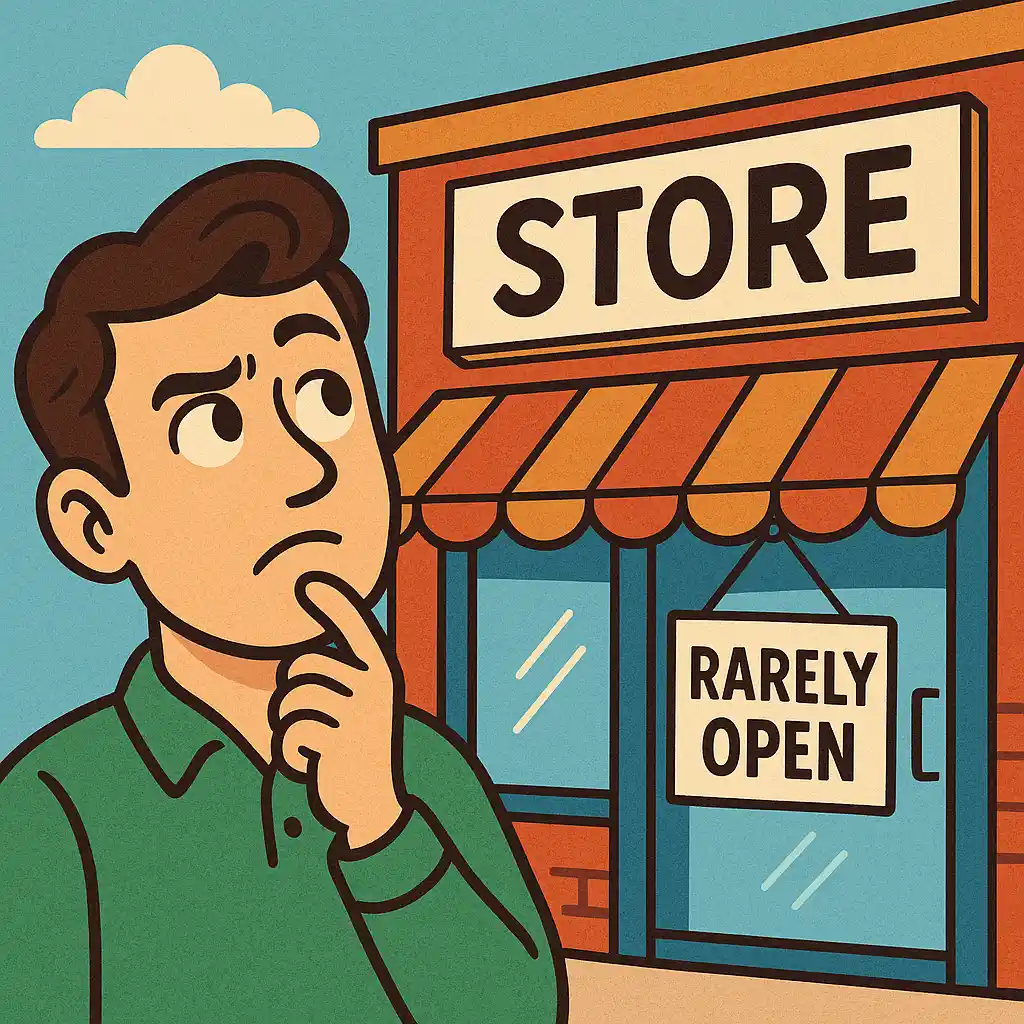
Denver, CO, USA - There’s a particular joy that comes from walking a main street with someone who notices things: the flapping poster nobody reads, the café that only serves decaf and mystery, the boutique whose window mannequin has been standing in the same defeated pose since before smartphones. And then there’s that other delight — the one that starts with a laugh and ends with a slow, uneasy head tilt: “How is that place still open?”

That question lives at the heart of an awkward, decades-old human ritual. People with money that can’t easily be explained often invest in stories. The story is the point. The store is the prop. You, the passerby, get the punchline: a mystery that is equal parts childish skulduggery and serious—sometimes dangerous—business.
This is a feature about that sensation: why storefronts become stagecraft, why grown-ups play at hide-and-seek with money, and why most of the time the empty shop on the corner is simply someone’s bad business or eccentric hobby. But sometimes, in the quiet spaces between jokes, the stakes are much higher.
Imagine you come into sudden cash. Maybe it’s stolen, maybe it was part of a con, maybe it’s the gross proceeds of a trade no one talks about. Banks ask questions. Tax forms exist. If you can’t point to a legitimate source — “I earned this”—you have a problem.
A retail storefront provides a neat little narrative: “I run a bakery.” The counter, a register that spits out receipts (real or cleverly faked), a bookkeeper who knows what to write — voilà. The cash has a story. It’s no longer an awkward pile; it’s revenue. That story does something useful: it makes the money look earned.
To be clear: saying “storefront equals crime” is nonsense. Most strange little shops are simply hobbies, lifestyle choices, speculative real estate gambits, or the stubborn love of an owner who will not quit. But the same simplicity that makes a storefront plausible as a story is precisely why some people use them as covers: they’re readable, they explain things, and they’re ordinary.
Disguising wealth is older than the ledgers that record it. Historians point to merchants in ancient empires routing funds through relatives and silent partners to avoid seizure or tax. Pirates and smugglers hid their gains in taverns and shipping ventures. Prohibition taught organized crime that a bar or speakeasy can be both a business and a screen. The terminology, the tech, and the tools change, but the human impulse is the same: build a convincing story and put the money behind it.
Modern complexity arrived with global banking, shell companies, and the internet. Today’s white-collar variants might involve offshore trusts and corporate layers; the blue-collar versions are often the empty storefronts, the car wash that somehow pays for two luxury SUVs, the catering company that never caters. Both serve the same storytelling function.
If you and your partner are like the people I love writing for — curious, wry, and suspicious in equal measure — here’s the short list you’ve already been laughing at. These are the things an ordinary person notices on the street that make the mind whisper, “hmm.”
Alone, each is explainable. Chain them together and the pattern looks less like eccentricity and more like an elaborate puppet show.
The reasons are pragmatic and sometimes banal:
There’s also a cultural logic: once one person in a community uses this trick and “gets away with it,” others mimic the pattern. It feels, chillingly, like passing down a successful prank.
From the outside, you’re right: it often looks childish. The furtive language, the euphemisms, the thrill of outsmarting a system — it’s make-believe writ large. A grown-up hiding something will use euphemisms (“put it through the books,” “we’ll invest in a business”) the way kids use code phrases to hide snacks from parents.
But the stakes are higher than a sneaky cookie raid. The proceeds that require hiding can be tied to real harm: victims of scams, exploited workers, trafficked people, violence, or systemic fraud. A prank of inflationary bookkeeping becomes a crime when it funds harm, corrupts transactions, or diminishes trust.
Legally, hiding illegal cash by “cleaning” it through a business does not erase the underlying crime. Paying taxes on ill-gotten gains doesn’t make the theft vanish. In fact, declaring suspicious income without proper legal counsel can create an evidentiary breadcrumb trail that makes prosecution easier.
You’re not a cop, and you shouldn’t play one. But if you’re curious, safe, and civic-minded, here are reasonable things to do — short, sensible, and non-confrontational:
There’s a scene in the life of every town where the empty shop becomes a small myth: the neighborhood’s private joke. That joke is often harmless, a way to explain the inexplicable. But it can also be a signpost pointing to a deeper problem — a system that is sometimes easy to abuse and hard to police.
So laugh at the mannequin that didn’t age, at the “lavender therapy” store that sells nothing but vibes, at the dental clinic that exists only on paper. Laugh, because these little absurdities make life interesting. But keep your curiosity honest. Pay attention to the pattern. When the childish game becomes a grown-up deception, someone — probably not you — should take off the costume and ask the hard questions.
After all, the best stories are the ones that begin with a laugh and end with the truth. And sometimes, as you and your wife know from your late-night walks and shared chuckles, the laugh is the easiest way into one hell of a story.